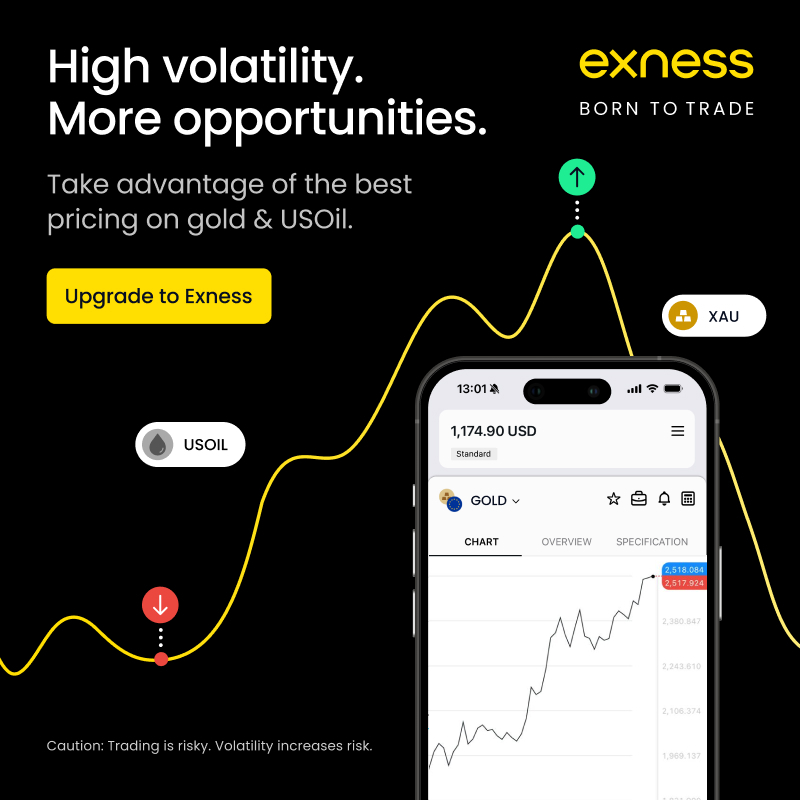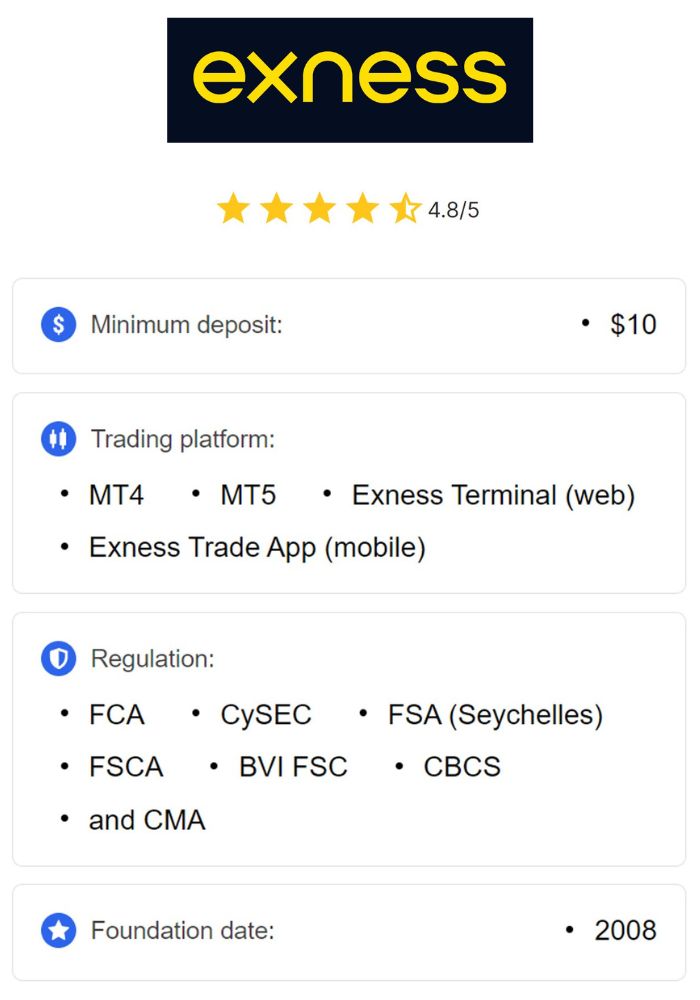
10 minute read
Is Exness Regulated in South Africa? A Comprehensive Guide for Traders
from Exness Global
Forex trading has surged in popularity across South Africa in recent years, with countless traders seeking reliable platforms to navigate the dynamic financial markets. Among the many brokers vying for attention, Exness stands out as a globally recognized name. But for South African traders, one critical question looms large: Is Exness regulated in South Africa? This article dives deep into Exness’s regulatory status, its operations in South Africa, and what it means for local traders. Whether you’re a beginner or a seasoned investor, understanding the regulatory framework of your broker is key to ensuring a safe and secure trading experience. Let’s explore everything you need to know about Exness and its standing in South Africa as of 2025.

💥 Trade with Exness now: Open An Account or Visit Brokers
What Is Exness? An Overview of the Broker
Before addressing the regulation question, it’s worth understanding what Exness is and why it’s gained traction worldwide. Founded in 2008, Exness is a forex and CFD (Contract for Difference) broker headquartered in Cyprus. Over the past 17 years, it has grown into one of the largest retail brokers globally, boasting a monthly trading volume exceeding $4.8 trillion as of early 2025. The broker offers a wide range of financial instruments, including forex pairs, commodities, cryptocurrencies, indices, and stocks, making it a versatile choice for traders with diverse portfolios.
Exness is known for its competitive trading conditions, such as tight spreads starting from 0.0 pips, high leverage options (up to unlimited in some cases), and lightning-fast order execution. It supports popular trading platforms like MetaTrader 4 (MT4), MetaTrader 5 (MT5), and its proprietary Exness Terminal, available on both desktop and mobile devices. Additionally, the broker provides educational resources, market analysis tools, and 24/7 customer support, catering to traders of all experience levels.
For South African traders, Exness offers localized features like the ability to open accounts in South African Rand (ZAR) and support for local payment methods, such as EFT and e-wallets. But while these perks are appealing, the real concern lies in its regulatory oversight—especially in a market like South Africa, where financial security is paramount.
The Importance of Regulation in Forex Trading
Before diving into Exness’s specific status, let’s establish why regulation matters in forex trading. The forex market is decentralized and operates globally, which makes it prone to risks like fraud, market manipulation, and unethical practices by brokers. Regulation serves as a safeguard, ensuring that brokers adhere to strict standards designed to protect traders’ funds and maintain market integrity.
A regulated broker is accountable to a financial authority, which enforces rules such as:
Segregation of client funds: Keeping traders’ money separate from the broker’s operational funds.
Transparency: Providing clear information about fees, spreads, and trading conditions.
Financial stability: Maintaining adequate capital reserves to withstand market volatility.
Dispute resolution: Offering a legal framework for addressing trader grievances.
In South Africa, the Financial Sector Conduct Authority (FSCA) is the primary regulatory body overseeing forex brokers and other financial service providers. Choosing an FSCA-regulated broker ensures that South African traders benefit from local protections, including recourse under South African law in case of disputes. So, where does Exness fit into this picture?
Is Exness Regulated in South Africa?
The short answer is yes, Exness is regulated in South Africa—but there’s more to the story. Exness operates in South Africa through its entity Exness ZA (PTY) Ltd, which is authorized by the FSCA as a Financial Service Provider (FSP) under FSP number 51024. This license was granted in 2020, marking a significant milestone in Exness’s expansion into the South African market. The FSCA’s oversight ensures that Exness complies with local financial regulations, providing a layer of security for South African traders.
However, there’s a nuance that traders should be aware of. While Exness ZA (PTY) Ltd holds an FSCA license, South African clients are often onboarded through the broker’s Seychelles-based entity, Exness (SC) Ltd, regulated by the Financial Services Authority (FSA) of Seychelles. This means that, in practice, many South African traders’ accounts are governed by Seychelles regulations rather than South African law. This dual-structure approach is common among global brokers, but it raises questions about the extent of local protection for South African clients.

💥 Trade with Exness now: Open An Account or Visit Brokers
Exness’s FSCA Regulation: What It Means
The FSCA is tasked with regulating South Africa’s non-banking financial sector, including forex brokers. Its primary goals are to:
Protect financial customers by ensuring fair treatment.
Enhance the efficiency and integrity of financial markets.
Prevent financial crime, such as money laundering and fraud.
Exness ZA (PTY) Ltd’s FSP license (number 51024) confirms that the broker meets the FSCA’s requirements, which include maintaining segregated client accounts, submitting regular financial audits, and adhering to anti-money laundering (AML) policies. This regulation provides South African traders with confidence that Exness operates within a framework designed to safeguard their interests.
However, the fact that South African clients are onboarded via the Seychelles entity introduces a layer of complexity. The Seychelles FSA is a reputable regulator, but it’s considered less stringent than top-tier authorities like the FSCA, the UK’s Financial Conduct Authority (FCA), or the Cyprus Securities and Exchange Commission (CySEC). As a result, South African traders may not enjoy the same level of local oversight—such as funds being held in South African banks or disputes being resolved under South African jurisdiction—as they would with a fully FSCA-governed account.
Exness’s Global Regulatory Framework
Exness’s regulation isn’t limited to South Africa or Seychelles. The broker operates under a multi-jurisdictional framework, holding licenses from several respected authorities worldwide. These include:
Cyprus Securities and Exchange Commission (CySEC): License number 178/12, governing Exness (Cy) Ltd.
Financial Conduct Authority (FCA): License number 730729, governing Exness (UK) Ltd.
Financial Services Authority (FSA) Seychelles: License number SD025, governing Exness (SC) Ltd.
Central Bank of Curaçao and Sint Maarten (CBCS): License number 0003LSI, governing Exness B.V.
Financial Services Commission (FSC) Mauritius: Governing Exness (MU) Ltd.
Capital Markets Authority (CMA) Kenya: License number 162, governing Tadenex Limited.
This extensive regulatory portfolio demonstrates Exness’s commitment to operating within international financial standards. For South African traders, these additional licenses add credibility, as they indicate that Exness is subject to oversight from multiple jurisdictions, each with its own set of compliance requirements.
How Does Exness Ensure Trader Safety?
Regulation is only part of the equation—how a broker implements safety measures is equally important. Exness has built a reputation for prioritizing trader security through several key practices:
1. Segregation of Client Funds
Exness keeps client funds in segregated accounts with top-tier banks, separate from its operational funds. This ensures that traders’ money remains protected, even if the broker faces financial difficulties.
2. Negative Balance Protection
Exness offers negative balance protection to all clients, meaning traders cannot lose more than their initial deposit. This feature is particularly valuable in volatile markets, where rapid price movements could otherwise lead to significant losses.
3. Regular Audits by Deloitte
Exness undergoes regular audits by Deloitte, one of the world’s leading audit firms. These audits verify the broker’s financial health and compliance with regulatory standards, enhancing transparency.
4. Advanced Security Technology
The broker employs SSL encryption to protect traders’ personal and financial data, reducing the risk of cyberattacks or unauthorized access.
5. Transparent Operations
Exness publishes its financial reports and performance metrics on its website, allowing traders to assess its stability and reliability.
For South African traders, these measures provide reassurance that Exness takes its responsibilities seriously, even if their accounts are managed through the Seychelles entity.
Pros and Cons of Trading with Exness in South Africa
To help South African traders make an informed decision, let’s weigh the advantages and disadvantages of using Exness.
Pros
FSCA Regulation: Exness ZA (PTY) Ltd’s FSP license ensures compliance with South African financial laws.
Competitive Trading Conditions: Low spreads, high leverage, and fast execution appeal to both novice and experienced traders.
Localized Services: ZAR accounts and local payment options simplify deposits and withdrawals.
Global Reputation: Multiple international licenses and a strong track record enhance trustworthiness.
User-Friendly Platforms: Support for MT4, MT5, and Exness Terminal caters to diverse trading preferences.
Cons
Seychelles Onboarding: South African clients are managed through the Seychelles entity, limiting FSCA-specific protections.
Limited Local Oversight: Funds may not be held in South African banks, and disputes may fall outside South African jurisdiction.
High Leverage Risks: While attractive, unlimited leverage can amplify losses if not managed carefully.
How Does Exness Compare to Other Brokers in South Africa?
South Africa’s forex market is competitive, with brokers like HotForex, FXTM, and XM also vying for traders’ attention. Here’s how Exness stacks up:
Regulation: Unlike some brokers that lack FSCA oversight, Exness holds an FSP license, though its Seychelles onboarding sets it apart from fully FSCA-regulated competitors.
Trading Costs: Exness’s tight spreads (as low as 0.0 pips on professional accounts) and low commissions give it an edge over brokers with higher fees.
Platform Options: Exness’s support for MT4, MT5, and its proprietary terminal matches or exceeds what most competitors offer.
Leverage: Exness’s unlimited leverage is a standout feature, though it’s riskier than the capped leverage (e.g., 1:500) offered by some rivals.
While Exness may not offer the same level of local protection as a fully FSCA-governed broker, its global credibility and cost-effective trading conditions make it a strong contender.
How to Start Trading with Exness in South Africa
If you’re considering Exness, here’s a step-by-step guide to getting started:
Visit the Exness Website: Go to www.exness.com and click “Register.”
Create an Account: Provide your details, including email and phone number, and choose ZAR as your account currency if desired.
Verify Your Identity: Upload identification documents (e.g., ID or passport) and proof of address for verification, typically completed within 48 hours.
Deposit Funds: Use local payment methods like EFT, credit cards, or e-wallets to fund your account. The minimum deposit varies by account type (e.g., $10 for Standard accounts).
Choose a Trading Platform: Download MT4, MT5, or use the Exness Terminal to start trading.
Begin Trading: Explore forex pairs, commodities, or other instruments based on your strategy.
Exness’s straightforward onboarding process makes it accessible for South African traders, even those new to forex.
What South African Traders Should Consider
While Exness is regulated in South Africa through its FSCA license, traders should weigh several factors:
Regulatory Trade-Offs: The Seychelles onboarding means less local protection, so assess your comfort level with international oversight.
Risk Management: High leverage and volatile markets require disciplined strategies, such as stop-loss orders and position sizing.
Research and Education: Leverage Exness’s resources to build your trading skills and stay informed about market trends.
Ultimately, your decision should align with your risk tolerance, trading goals, and preference for local versus global regulation.
Conclusion: Is Exness a Safe Choice for South African Traders?
So, is Exness regulated in South Africa? Yes, it is—through Exness ZA (PTY) Ltd’s FSCA license (FSP 51024). However, the practical reality is that South African traders are onboarded via the Seychelles entity, which shifts some regulatory oversight away from the FSCA. Despite this, Exness remains a reputable broker, backed by multiple international licenses, robust safety measures, and a strong global presence.
For South African traders, Exness offers a compelling mix of low-cost trading, advanced tools, and localized support. While it may not provide the full scope of FSCA-specific protections, its transparency, negative balance protection, and audited operations make it a trustworthy option. As with any forex broker, success depends on understanding the risks and trading responsibly.
If you’re ready to explore Exness, visit their website, open an account, and start your trading journey with confidence. Have you traded with Exness in South Africa? Share your experience in the comments below!
💥 Note: To enjoy the benefits of the partner code, such as trading fee rebates, you need to register with Exness through this link: Open An Account or Visit Brokers 🏆
Read more:

